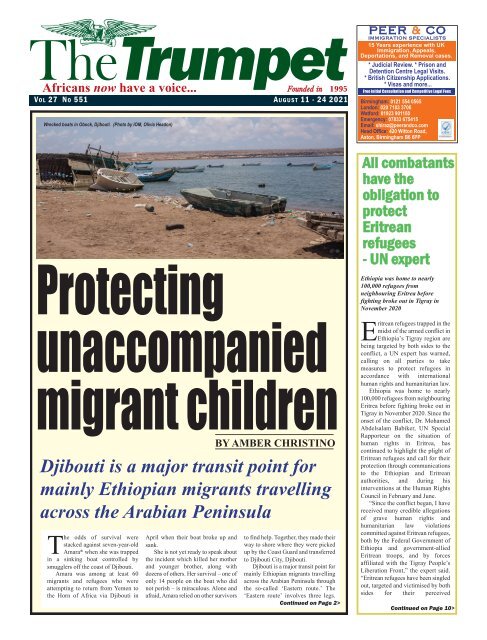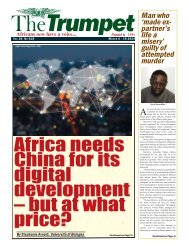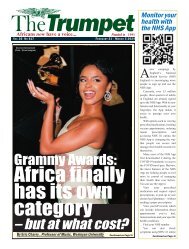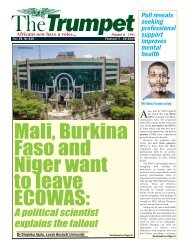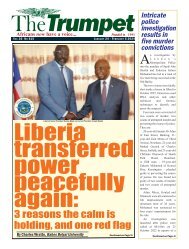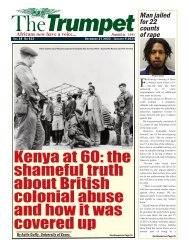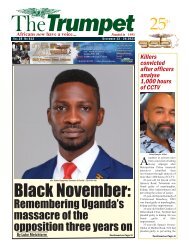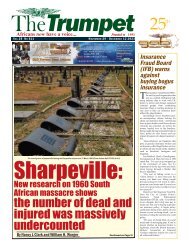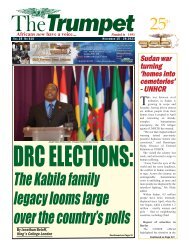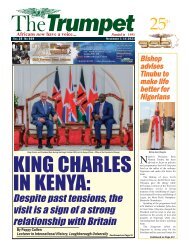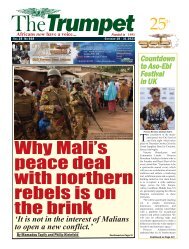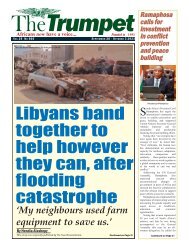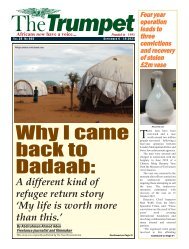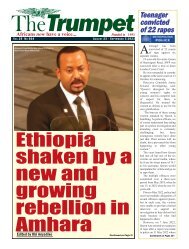The Trumpet Newspaper Issue 551 (August 11 - 24 2021)
Protecting Unaccompanied Migrant Children
Protecting Unaccompanied Migrant Children
You also want an ePaper? Increase the reach of your titles
YUMPU automatically turns print PDFs into web optimized ePapers that Google loves.
<strong>The</strong><strong>Trumpet</strong><br />
Africans now have a voice... Founded in 1995<br />
V O L 27 N O <strong>551</strong> AU G U S T <strong>11</strong> - <strong>24</strong> <strong>2021</strong><br />
Wrecked boats in Obock, Djibouti. (Photo by IOM, Olivia Headon)<br />
Protecting<br />
unaccompanied<br />
migrant children<br />
<strong>The</strong> odds of survival were<br />
stacked against seven-year-old<br />
Amara* when she was trapped<br />
in a sinking boat controlled by<br />
smugglers off the coast of Djibouti.<br />
Amara was among at least 60<br />
migrants and refugees who were<br />
attempting to return from Yemen to<br />
the Horn of Africa via Djibouti in<br />
April when their boat broke up and<br />
sank.<br />
She is not yet ready to speak about<br />
the incident which killed her mother<br />
and younger brother, along with<br />
dozens of others. Her survival – one of<br />
only 14 people on the boat who did<br />
not perish – is miraculous. Alone and<br />
afraid, Amara relied on other survivors<br />
BY AMBER CHRISTINO<br />
Djibouti is a major transit point for<br />
mainly Ethiopian migrants travelling<br />
across the Arabian Peninsula<br />
to find help. Together, they made their<br />
way to shore where they were picked<br />
up by the Coast Guard and transferred<br />
to Djibouti City, Djibouti.<br />
Djibouti is a major transit point for<br />
mainly Ethiopian migrants travelling<br />
across the Arabian Peninsula through<br />
the so-called ‘Eastern route.’ <strong>The</strong><br />
‘Eastern route’ involves three legs.<br />
Continued on Page 2><br />
PEER & CO<br />
IMMIGRATION SPECIALISTS<br />
15 Years experience with UK<br />
Immigration, Appeals,<br />
Deportations, and Removal cases.<br />
* Judicial Review. * Prison and<br />
Detention Centre Legal Visits.<br />
* British Citizenship Applications.<br />
* Visas and more...<br />
Free Initial Consultation and Competitive Legal Fees<br />
Birmingham: 0121 554 0565<br />
London: 020 7183 3706<br />
Watford: 01923 90<strong>11</strong>50<br />
Emergency: 07833 675415<br />
Email: shiraz@peerandco.com<br />
Head Office: 420 Witton Road,<br />
Aston, Birmingham B6 6PP<br />
All combatants<br />
have the<br />
obligation to<br />
protect<br />
Eritrean<br />
refugees<br />
- UN expert<br />
Ethiopia was home to nearly<br />
100,000 refugees from<br />
neighbouring Eritrea before<br />
fighting broke out in Tigray in<br />
November 2020<br />
Eritrean refugees trapped in the<br />
midst of the armed conflict in<br />
Ethiopia’s Tigray region are<br />
being targeted by both sides to the<br />
conflict, a UN expert has warned,<br />
calling on all parties to take<br />
measures to protect refugees in<br />
accordance with international<br />
human rights and humanitarian law.<br />
Ethiopia was home to nearly<br />
100,000 refugees from neighbouring<br />
Eritrea before fighting broke out in<br />
Tigray in November 2020. Since the<br />
onset of the conflict, Dr. Mohamed<br />
Abdelsalam Babiker, UN Special<br />
Rapporteur on the situation of<br />
human rights in Eritrea, has<br />
continued to highlight the plight of<br />
Eritrean refugees and call for their<br />
protection through communications<br />
to the Ethiopian and Eritrean<br />
authorities, and during his<br />
interventions at the Human Rights<br />
Council in February and June.<br />
“Since the conflict began, I have<br />
received many credible allegations<br />
of grave human rights and<br />
humanitarian law violations<br />
committed against Eritrean refugees,<br />
both by the Federal Government of<br />
Ethiopia and government-allied<br />
Eritrean troops, and by forces<br />
affiliated with the Tigray People’s<br />
Liberation Front,” the expert said.<br />
“Eritrean refugees have been singled<br />
out, targeted and victimised by both<br />
sides for their perceived<br />
Continued on Page 10>
Page2 <strong>The</strong><strong>Trumpet</strong> AUGUST <strong>11</strong> - <strong>24</strong> <strong>2021</strong><br />
News<br />
Alone and Afraid: Protecting<br />
unaccompanied migrant children<br />
along the ‘Eastern Route’<br />
Continued from Page 1<<br />
<strong>The</strong> first is from the migrants’ countries of<br />
origin to Obock in Djibouti or Bosaso in<br />
Somalia. <strong>The</strong> second involves the sea<br />
journey between Obock or Bosaso and<br />
Yemen, and the border crossing point from<br />
Yemen to other Gulf States – mainly the<br />
Kingdom of Saudi Arabia (KSA).<br />
Typically, over 90 per cent of the<br />
migrants who arrive in Yemen hope to<br />
make it to KSA, but with increased border<br />
security since April 2020 due to the<br />
COVID-19 pandemic, crossing into the<br />
country has become almost impossible.<br />
“Many had hoped to find work in the<br />
Gulf to repay the debt that financed their<br />
journey and send money home to their<br />
families,” says Mouna Ibrahim, National<br />
Protection Officer at IOM Djibouti.<br />
Amara plays at the Caritas children’s shelter before her departure to reunite with family in Ethiopia. Photo<br />
- IOM, Hawa Diallo)<br />
“However, their hopes were dashed once<br />
they discovered that it would be<br />
impossible to reach their final destination<br />
due to border restrictions.”<br />
As a result, at least 32,000 migrants<br />
have been stranded in Yemen, living with<br />
extremely limited access to shelter, health<br />
care, food and water. Migrants in Yemen<br />
are subjected to human rights abuses<br />
including kidnapping, exploitation, and<br />
arbitrary detention. <strong>The</strong>se risks existed<br />
before the pandemic but have been rising<br />
over the past 18 months.<br />
With few options to return home,<br />
migrants along this route mainly risk using<br />
smugglers for the sea crossing back to<br />
Djibouti and Somalia without any<br />
guarantee of safe arrival. Smugglers use<br />
small, unseaworthy and overcrowded<br />
boats that can easily capsize. Occasionally<br />
some throw migrants overboard to reduce<br />
the weight.<br />
Migrants at the MRC participate in a social activity aimed at raising awareness on the risks and dangers of<br />
irregular migration. (Photo - IOM, Alexander Bee)<br />
According to IOM’s 2020 , Ethiopian<br />
men make up 72 per cent of movements<br />
along this route, but IOM is observing a<br />
higher number of Unaccompanied Migrant<br />
Children (UMCs) taking this dangerous<br />
journey that cuts through desert regions,<br />
the sea and war-torn Yemen. <strong>The</strong><br />
proportion of UMCs increased between<br />
2019 (6 per cent) and 2020 (9 per cent).<br />
Overall, UMCs make up 71 per cent of all<br />
migrating children along the ‘Eastern<br />
LAND FOR SALE<br />
at Isoko<br />
Estates<br />
Nigeria<br />
route’ in 2020, compared to 46 per cent in<br />
2019.<br />
It is common for many of these<br />
children to leave their homes without<br />
information about the journey ahead.<br />
Some are not even aware that they will be<br />
crossing a body of water or passing<br />
through conflict areas. Research by IOM<br />
indicates that more than half (59 per cent)<br />
of the first-time migrants recently<br />
interviewed in Obock did not inform their<br />
families of their decision to migrate before<br />
their departure, most commonly due to<br />
fear their family would have prevented<br />
them from going or because they did not<br />
want to worry them.<br />
<strong>The</strong> , developed by IOM and the<br />
African Union, explains that children –<br />
with or without their families – migrate or<br />
flee within Africa for a variety of reasons,<br />
often in search of livelihoods and other<br />
social support that allows them to access<br />
their basic needs.<br />
“Migrant children along the ‘Eastern<br />
route’ are especially vulnerable to<br />
Continued on Page 4<<br />
1) ONE (1) Acre of Land (6 Plots) at OKUSHU in OKO-AFO close to AGBARA<br />
and ATAN to ADO-ODO, off BADAGRY Express way. This is an upcoming<br />
residential developing area.<br />
<strong>The</strong> electricity supply from the national grid, is through Agbara. Very dry soil,<br />
Not flood plain (NO FLOOD PROBLEMS) PRICE: N1.5 MILLION.<br />
2) 2 Plots of Land for Sale at ERUKU - OKO-AFO; AGBARA AREA, also, ATAN,<br />
and ADO-ODO, through Badagry Express way, and it also benefits from good<br />
transport systems and national grid is through Agbara and ATAN area.<br />
PRICE: N900,000. Nine Hundred Thousand Naira.<br />
All the above properties are recommended for early grab as we are inaundated<br />
with enquiries, therefore, first come, first served.<br />
PLEASE CALL :- +44 (0)7802 575486 - JOE<br />
PEER & CO<br />
IMMIGRATION SPECIALISTS<br />
15 Years experience with UK<br />
Immigration, Appeals,<br />
Deportations, and Removal cases.<br />
* Judicial Review. * Prison and<br />
Detention Centre Legal Visits.<br />
* British Citizenship Applications.<br />
* Visas and more...<br />
Free Initial Consultation and Competitive Legal Fees<br />
Birmingham: 0121 554 0565<br />
London: 020 7183 3706<br />
Watford: 01923 90<strong>11</strong>50<br />
Emergency: 07833 675415<br />
Email: shiraz@peerandco.com<br />
Head Office: 420 Witton Road,<br />
Aston, Birmingham B6 6PP
AUGUST <strong>11</strong> - <strong>24</strong> <strong>2021</strong> <strong>The</strong><strong>Trumpet</strong><br />
Page3
Page4<br />
<strong>The</strong><strong>Trumpet</strong><br />
<strong>The</strong><strong>Trumpet</strong> Group<br />
Field: 07956 385 604<br />
E-mail:<br />
info@the-trumpet.com<br />
<strong>The</strong><strong>Trumpet</strong>Team<br />
PUBLISHER / EDITOR-IN-CHIEF:<br />
’Femi Okutubo<br />
CONTRIBUTORS:<br />
Moji Idowu, Ayo Odumade,<br />
Steve Mulindwa<br />
SPECIAL PROJECTS:<br />
Odafe Atogun<br />
John-Brown Adegunsoye (Abuja)<br />
DESIGN:<br />
Xandydesigns@gmail.com<br />
ATLANTA BUREAU CHIEF:<br />
Uko-Bendi Udo<br />
3695 F Cascade Road #2140 Atlanta,<br />
GA 30331 USA<br />
Tel: +1 404 889 3613<br />
E-mail: uudo1@hotmail.com<br />
BOARD OF CONSULTANTS<br />
CHAIRMAN:<br />
Pastor Kolade Adebayo-Oke<br />
MEMBERS:<br />
Tunde Ajasa-Alashe<br />
Allison Shoyombo, Peter Osuhon<br />
<strong>The</strong><strong>Trumpet</strong> (ISSN: 1477-3392)<br />
is published in London fortnightly<br />
THINKING<br />
OF<br />
WRITING<br />
A BUSINESS<br />
PLAN?<br />
AUGUST <strong>11</strong> - <strong>24</strong> <strong>2021</strong><br />
We can help you develop a<br />
professional business plan<br />
from only £250.<br />
For more information, contact us<br />
at 07402792146 or email us at:<br />
tolu.oyewole@consultant.com<br />
News<br />
Alone and Afraid: Protecting<br />
unaccompanied migrant children<br />
along the ‘Eastern Route’<br />
Continued from Page 2<<br />
violence, forced labour, trafficking and<br />
detention, which is further intensified for<br />
unaccompanied or separated children who<br />
are often unable to protect themselves<br />
during their risky journey,” says IOM’s<br />
Ibrahim. Mental health issues including<br />
post-traumatic stress disorder are also<br />
prevalent among UMCs.<br />
States have an obligation under the<br />
United Nations Convention of the Rights<br />
of the Child (UNCRC) to protect children,<br />
and humanitarian actors, both international<br />
and local partners, also coordinate with the<br />
State to provide specialized protection and<br />
care. This collaboration ensures that the<br />
rights of children are upheld, namely, nondiscrimination,<br />
best interest of the child,<br />
the right to life, survival, and development,<br />
right to food, shelter, health and health<br />
services, education, name and nationality,<br />
freedom from torture, cruel, inhuman, or<br />
degrading treatment or punishment,<br />
protection from sexual exploitation and<br />
abuse, and the right to parental care and<br />
protection.<br />
In Obock, Djibouti, IOM Migrant<br />
Response Centre (MRC) staff regularly<br />
welcome and offer support to<br />
unaccompanied migrant children who<br />
have returned from the Gulf. In the MRC,<br />
migrants have access to medical services,<br />
psychosocial support, referrals to other<br />
services, and are provided with<br />
information and assistance to safely return<br />
to home.<br />
“At the MRC, the mental health and<br />
psychosocial support (MHPSS) services<br />
provided by IOM staff help to address the<br />
negative psychological reactions of<br />
children who have undergone traumatic<br />
experiences to help them in the recovery<br />
process,” says Ibrahim.<br />
Each migrant (including UMCs)<br />
undergoes vulnerability screening to<br />
identify their immediate needs,<br />
Migrants crossing the desert to Obock, Djibouti. (Photo - IOM, Alexander Bee)<br />
counselling, and registration. A best<br />
interest assessment is conducted for<br />
unaccompanied children. When the child<br />
wants to return home voluntarily, IOM, in<br />
coordination with the Djiboutian and<br />
country of origin authorities and partners,<br />
Bubble In Christ Music Band<br />
For your Music band with<br />
classic rendition for all<br />
occasions, with traditional,<br />
contemporary African<br />
international and Gospel filled<br />
with professional decent<br />
Presentation.<br />
More Musicians, Singers,<br />
Instrumentalists, handy men,<br />
Music directors band coordinators,<br />
Audio and/or video<br />
technicians, Drivers,<br />
Marketing Personnel are<br />
welcome.<br />
Contact: Olugbenga on<br />
07438 264613<br />
CHERUBIM & SERAPHIM MOVEMENT CHURCH<br />
Amazing Grace District -London Branch 2<br />
God’s Promises<br />
never fail:<br />
* Before they call I<br />
will answer; while<br />
they are still<br />
speaking I will hear<br />
(Isaiah 65: <strong>24</strong>)<br />
With support from IOM, street children in Djibouti city are hosted at Caritas and receive hot meals.<br />
(Photo - IOM, Alexander Bee)<br />
WEEKLY DELIVERANCE SERVICE<br />
Deliverance: Every Wednesday<br />
Time: 6.30pm – 7pm (Individual Prayer & Counselling)<br />
Midweek Church Service: 7pm – 9pm<br />
Venue: Orange Room, Albany <strong>The</strong>atre, Douglas Way,<br />
London SE8 4AG<br />
Other Service: Sunday Thanks giving <strong>11</strong>am – 1.30pm<br />
Continued on Page 9<<br />
* He will call upon me and I<br />
will answer him: I will be<br />
with him in trouble, I will<br />
deliver him and honour him<br />
(Psalm 91: 15)<br />
For further information, contact - Church Secretary: S/M/I/I (Dr) I Oni-Owoyemi 07788 745231 Or<br />
Church Elders: S/A T Owoyemi 07956 996689 or / M/S/A W Ojomo 07939 836499 or / Apostle T Gbolasere 07484 <strong>24</strong>3990<br />
Email: amazinggracebranch2@gmail.com
Family Food Stories<br />
AUGUST <strong>11</strong> - <strong>24</strong> <strong>2021</strong><br />
<strong>The</strong><strong>Trumpet</strong><br />
Page5<br />
Janet and Paul’s<br />
Healthy Taste of<br />
Back Home<br />
We know the last year has been<br />
challenging. With changes to our<br />
routines and more time at home,<br />
lots of us have picked up the odd<br />
unhealthy habit. But whether you<br />
want to eat better or lose weight,<br />
now is a great time to get started.<br />
Like many of us, Janet and Paul Soile<br />
from London gained some extra weight<br />
during lockdown. To help get their weight<br />
on track they started looking for ways<br />
to make their favourite foods healthier,<br />
<br />
<br />
As a former Stroke Information Advisor,<br />
Janet used to educate people about<br />
health risk factors and how to reduce<br />
the risk of having a stroke. “As Africans,<br />
we were e used to eating oily foods, but<br />
through working as a health advisor I<br />
learnt about the health risks that come<br />
with eating in this manner. So instead of<br />
just teaching people how to be healthier I<br />
decided to take my own advice!”<br />
Janet does most of the cooking but<br />
her husband Paul helps whenever he’s<br />
around. “Paul’s a pastor so he’s always<br />
busy with community work, but we<br />
usually cook together at least twice a<br />
week,” shares Janet.<br />
<strong>The</strong>ir favourite household recipe is honey<br />
beans and plantain. Beans are a cheap,<br />
<br />
<br />
Janet is “always encouraging the kids<br />
to eat them!” As for the plantains, she<br />
would typically fry them with oil but has<br />
swapped to air frying or cooking them<br />
in the oven. “It comes out very nice -<br />
everyone is so surprised at how lovely<br />
they taste.”<br />
As well as changing her cooking methods,<br />
Janet has cut back on the amount of salt<br />
she uses. “You’d never guess that we’ve<br />
made changes since it tastes more or<br />
less the same, if not better.” Janet notes<br />
that even the children enjoy the healthier<br />
recipes. “<strong>The</strong>y’ve been eating their beans,<br />
without me having to push them.”<br />
For Janet, the best part of becoming<br />
healthier has been doing it together as<br />
a family. “Paul and I live, cook, and eat<br />
together - and it’s really strengthened<br />
our relationship.” She says that her<br />
<br />
healthier and more energised.<br />
Consultant Dietitian, Douglas<br />
Twenefour, adds: “Traditional African<br />
dishes are an integral part of our<br />
community and culture, but we need<br />
to be aware of how we prepare and<br />
serve them, and portion sizes. By<br />
making simple changes, you can<br />
continue to enjoy your favourite<br />
meals, manage your weight and help<br />
cut your risk of serious diseases like<br />
strokes, type 2 diabetes and certain<br />
types of cancers.”<br />
Douglas’ three tips<br />
for healthier eating:<br />
1. Become portion aware<br />
Swap your usual plate or bowl for one<br />
that’s smaller, and try to say no to<br />
second helpings.<br />
2. Include more fruit and vegetables<br />
<br />
<br />
fresh, frozen and tinned all count.<br />
3. Swap your carbs<br />
Swap white rice for brown rice, and<br />
<br />
<br />
<br />
plantain, beans, sweet potatoes and<br />
green bananas.<br />
Ewa Oloyin<br />
(Honey beans and steamed plantain)<br />
Serves: 4<br />
Preparation time:<br />
10 minutes<br />
Cooking time: 60 minutes<br />
Ingredient list:<br />
300g (West African) honey beans –<br />
(soaked overnight, washed and drained)<br />
150g chopped onion<br />
2 teaspoons vegetable oil<br />
1 teaspoon ground chilli pepper<br />
1 teaspoon salt<br />
150g red bell pepper chopped<br />
700ml – 1000ml water<br />
350g (two medium sticks)<br />
ripe peeled plantain<br />
What to do:<br />
1. Add 700mls of cold water to a large<br />
saucepan, bring to boil and add beans,<br />
half of chopped onion. Cover the saucepan<br />
and cook beans for about 40mins.<br />
2. Test whether the beans are cooked by<br />
mashing a few with the back of a fork.<br />
Add more water (200ml at a time) and<br />
cook until beans are easy to mash with<br />
a fork.<br />
3. Add the remaining chopped onion, oil,<br />
ground pepper, and salt. Stir well and<br />
allow to cook for further 5 minutes on<br />
low heat. <strong>The</strong>n add chopped bell pepper<br />
– stir well, simmer for 2 mins on low heat.<br />
Preparing the plantain<br />
Advertorial<br />
1. Cut each plantain into 4-5 pieces.<br />
Steam for 15 minutes.<br />
2. Cooked plantain should be soft when<br />
pricked with a fork.<br />
3. Serve with honey beans.<br />
Free help and support<br />
If you want to eat better or lose weight, making small, simple changes can make all<br />
<br />
<br />
<br />
Search ‘Better Health’ or visit nhs.uk/betterhealth<br />
for free tools and support.
Page6 <strong>The</strong><strong>Trumpet</strong> AUGUST <strong>11</strong> - <strong>24</strong> <strong>2021</strong><br />
NEW CAMPAIGN SHOWCASES HOW<br />
DWP WORK COACHES ARE HELPING<br />
JOBSEEKERS FIND WORK<br />
Anew campaign showcasing how Work Coaches are helping<br />
jobseekers back into work through a government website has been<br />
launched by the Department for Work and Pensions (DWP).<br />
<strong>The</strong> campaign aims to increase usage of the JobHelp website, as well as<br />
raising awareness and increasing uptake of the Work Coach support,<br />
government skills, employment and support programmes and training<br />
courses available to those eligible.<br />
DWP’s ‘jobs army’ of Work Coaches, including 13,500 additional<br />
recruits taken on since the COVID-19 pandemic hit, are using online<br />
resource JobHelp to tackle unemployment in the UK.<br />
<strong>The</strong> JobHelp website opens up the expertise of DWP Work Coaches to<br />
jobseekers who are unable to claim Universal Credit (UC), while offering<br />
UC customers an online resource to refer back to throughout their job<br />
search.<br />
Large parts of the economy temporarily shut during the pandemic as<br />
lockdowns were deployed to curb the spread of COVID-19. Under-25s<br />
have been disproportionately impacted, partly as they are more likely to<br />
work in sectors such retail, hospitality and leisure, which have been badly<br />
hit. Young people made up 57% of the fall in employment in the past year,<br />
with young Black Brits particularly vulnerable to losing jobs. 1<br />
Between October and December 2020, 41.6% of black people aged 16-<br />
<strong>24</strong> were unemployed - the highest rate since the last financial crisis.<br />
Heading into the pandemic, one in four Black young people in this age<br />
group was unemployed. 2<br />
This includes <strong>24</strong>-year-old Thanda Nomvete from North London, who<br />
after being unemployed for over a year, turned to his local Jobcentre Plus<br />
for help. “During COVID-19, the job market became extremely<br />
competitive and it was hard to find a role that I really wanted,” he says.<br />
Unable to meet people in person, it was particularly tough for Thanda to<br />
widen his network and make new connections.<br />
That’s when Thanda’s DWP Work Coach Bola introduced him to the<br />
JobHelp website, which provided him with the latest information to find<br />
opportunities in a wide range of sectors, including the NHS, adult social<br />
care, retail, food production and logistics. From guidance articles to online<br />
tools, JobHelp helped Thanda access useful resources to help him with his<br />
job search and successfully find a new role.<br />
Thanda’s Work Coach Bola was aware of the different barriers job<br />
seekers like Thanda face. “Many young Black Asian and Minority Ethnic<br />
people are sensitive to being targeted because of their ethnicity,” she says.<br />
“<strong>The</strong>y feel singled-out, so it’s important to listen to them in order to be able<br />
to properly support them.” To help overcome such barriers, Bola helps<br />
young job seekers with their CVs, interview techniques and confidence<br />
building, and makes an effort to check in on their mental health and wellbeing.<br />
Packed with tips on everything from how to craft a perfect CV to<br />
perfecting video interviewing skills, the JobHelp website is a good place for<br />
jobseekers to start their job search, particularly as the economy starts to<br />
pick up.<br />
“As restrictions ease, organisations across the country will increasingly<br />
be looking for new people to join them. If you’re applying for work, the<br />
JobHelp website can help you find these vacancies and support you with<br />
every stage of your application,” says Mims Davies MP, Minister for<br />
Employment. “We know this has been a challenging time, but we are<br />
serious about supporting Britain’s workforce as we build back better.”<br />
For more information about JobHelp, visit https://gov.uk/jobhelp<br />
1<br />
Sewell Report<br />
2<br />
ONS
AUGUST <strong>11</strong> - <strong>24</strong> <strong>2021</strong> <strong>The</strong><strong>Trumpet</strong><br />
Page7
Page8 <strong>The</strong><strong>Trumpet</strong> AUGUST <strong>11</strong> - <strong>24</strong> <strong>2021</strong>
News<br />
AUGUST <strong>11</strong> - <strong>24</strong> <strong>2021</strong><br />
<strong>The</strong><strong>Trumpet</strong><br />
West Africa’s first-ever case of<br />
Marburg virus disease confirmed<br />
Page9<br />
Health authorities in Guinea have<br />
confirmed a case of Marburg virus<br />
disease in the southern Gueckedou<br />
prefecture. This is the first time Marburg, a<br />
highly infectious disease that causes<br />
haemorrhagic fever, has been identified in<br />
the country, and in West Africa.<br />
Marburg, which is in the same family as<br />
the virus that causes Ebola, was detected less<br />
than two months after Guinea declared an<br />
end to an Ebola outbreak that erupted earlier<br />
this year. Samples taken from a nowdeceased<br />
patient and tested by a field<br />
laboratory in Gueckedou as well as Guinea’s<br />
national haemorrhagic fever laboratory<br />
turned out positive for the Marburg virus.<br />
Further analysis by the Institut Pasteur in<br />
Senegal confirmed the result.<br />
<strong>The</strong> patient had sought treatment at a<br />
local clinic in Koundou area of Gueckedou,<br />
where a medical investigation team had been<br />
dispatched to probe his worsening<br />
symptoms.<br />
“We applaud the alertness and the quick<br />
investigative action by Guinea’s health<br />
workers. <strong>The</strong> potential for the Marburg virus<br />
to spread far and wide means we need to<br />
stop it in its tracks,” said Dr Matshidiso<br />
Moeti, World Health Organization (WHO)<br />
Regional Director for Africa. “We are<br />
working with the health authorities to<br />
implement a swift response that builds on<br />
Guinea’s past experience and expertise in<br />
managing Ebola, which is transmitted in a<br />
similar way.”<br />
Gueckedou, where Marburg has been<br />
confirmed, is also the same region where<br />
cases of the <strong>2021</strong> Ebola outbreak in Guinea<br />
as well as the 2014–2016 West Africa<br />
outbreak were initially detected.<br />
Efforts are underway to find the people<br />
who may have been in contact with the<br />
patient. As the disease is appearing for the<br />
first time in the country, health authorities<br />
are launching public education and<br />
community mobilization to raise awareness<br />
and galvanize support to help curb<br />
widespread infection.<br />
An initial team of 10 WHO experts,<br />
including epidemiologists and socioanthropologists<br />
is on the ground helping to<br />
investigate the case and supporting the<br />
national health authorities to swiftly step-up<br />
emergency response, including risk<br />
assessment, disease surveillance, community<br />
mobilization, testing, clinical care, infection<br />
prevention as well as logistical support.<br />
Cross-border surveillance is also being<br />
enhanced to quickly detect any cases, with<br />
neighbouring countries on alert. <strong>The</strong> Ebola<br />
control systems in place in Guinea and in<br />
neighbouring countries are proving crucial<br />
to the emergency response to the Marburg<br />
virus.<br />
Marburg is transmitted to people from<br />
fruit bats and spreads among humans<br />
through direct contact with the bodily fluids<br />
of infected people, surfaces and materials.<br />
Illness begins abruptly, with high fever,<br />
severe headache and malaise. Many patients<br />
develop severe haemorrhagic signs within<br />
seven days. Case fatality rates have varied<br />
from <strong>24</strong>% to 88% in past outbreaks<br />
depending on virus strain and case<br />
management.<br />
Although there are no vaccines or<br />
antiviral treatments approved to treat the<br />
virus, supportive care – rehydration with oral<br />
or intravenous fluids – and treatment of<br />
specific symptoms, improves survival. A<br />
range of potential treatments, including<br />
blood products, immune therapies and drug<br />
therapies, are being evaluated.<br />
In Africa, previous outbreaks and<br />
sporadic cases have been reported in Angola,<br />
the Democratic Republic of the Congo,<br />
Kenya, South Africa and Uganda.<br />
Alone and Afraid: Protecting<br />
unaccompanied migrant children<br />
along the ‘Eastern Route’<br />
Continued from Page 4<<br />
starts the family tracing and assessment<br />
process to identify the best type of<br />
reintegration assistance upon return.<br />
In Amara’s case, she was placed in a<br />
children’s shelter run by Caritas in<br />
Djibouti City while a ‘best interests’ panel<br />
– the first of its kind in Djibouti, convened<br />
for the most sensitive protection cases –<br />
was organized to determine an appropriate<br />
action plan.<br />
<strong>The</strong> panel, comprising key protection<br />
actors in Djibouti – including the Ministry<br />
of Women and Family, the Ministry of<br />
Social Affairs, the Ministry of Justice,<br />
United Nations Agencies, local NGOs and<br />
other protection partners, as well as the<br />
Ethiopian Embassy – unanimously<br />
decided to return Amara to Ethiopia, her<br />
country of origin. This would allow her to<br />
reunite with family and receive follow-up<br />
care.<br />
While the panel was making its<br />
decision, IOM staff ensured Amara<br />
received mental health and psychosocial<br />
(MHPSS) support by referring her to a<br />
clinical psychologist trained to work with<br />
traumatized children. This type of care is a<br />
critical service provided to migrants,<br />
especially children, who arrive at the<br />
MRC.<br />
In addition to one-on-one counselling,<br />
IOM staff regularly lead focus groups that<br />
allow the children to discuss the<br />
difficulties they experienced during their<br />
journeys and the fears they may have<br />
about returning home. To help ensure they<br />
remain busy throughout the day, an IOM<br />
MHPSS Assistant develops a schedule<br />
complete with activities such as martial<br />
arts and gardening.<br />
Just over two months after her tragic<br />
ordeal, Amara left Djibouti on <strong>24</strong> June<br />
<strong>2021</strong>, accompanied by the IOM protection<br />
focal person for UMCs in Djibouti, to<br />
reunite with her surviving family members<br />
in Ethiopia. Her travel was coordinated by<br />
staff from IOM Djibouti and Ethiopia who<br />
ensured that Amara would safely reach her<br />
destination. Now that she has joined her<br />
family, IOM staff in Ethiopia will continue<br />
to follow up with Amara and support her<br />
reintegration.<br />
Thousands of migrants, including<br />
unaccompanied children like Amara,<br />
remain stranded along the ‘Eastern route’.<br />
To continue providing life-saving return<br />
and reintegration services, IOM has<br />
launched an appeal for USD 99 million,<br />
for which additional support is desperately<br />
needed. Crucially, this appeal will also<br />
support Member States to strengthen child<br />
protection mechanisms along this route.<br />
Sadly, Amara’s story is only one of<br />
thousands of untold tragedies experienced<br />
every day by migrants along the perilous<br />
‘Eastern route’.<br />
Together with governments and<br />
humanitarian partners, IOM is committed<br />
to addressing the dire humanitarian,<br />
human rights, safety and security<br />
challenges faced by migrants in the region<br />
– especially unaccompanied children like<br />
Amara.<br />
IOM’s voluntary return and<br />
reintegration support in the East and Horn<br />
of Africa is made possible thanks to the<br />
EU-IOM Joint Initiative, a three-way<br />
partnership between the European Union<br />
(EU), IOM, and 26 African countries.<br />
Since March 2017, over 7,000 migrants in<br />
the region have returned home and more<br />
than 9,000 returnees have started the<br />
reintegration process to re-establish their<br />
lives in Ethiopia, Somalia and Sudan, as<br />
well as in Djibouti, Eritrea, Kenya, South<br />
Sudan and Uganda.<br />
*Amara’s name has been changed to<br />
protect her privacy.<br />
This story was written by Amber<br />
Christino, Media and Communications<br />
Officer at the IOM Regional Office for the<br />
East and Horn of Africa, Email:<br />
achristino@iom.int
Page10 <strong>The</strong><strong>Trumpet</strong> AUGUST <strong>11</strong> - <strong>24</strong> <strong>2021</strong><br />
News<br />
‘Millions of children going hungry<br />
in North-East Nigeria’<br />
– Save <strong>The</strong> Children warns<br />
Millions of children going hungry in North-East Nigeria<br />
Save the Children has expressed deep<br />
concern that an estimated 2.3 million<br />
children and youth, including some<br />
700,000 children under Five, are going<br />
hungry in North-East Nigeria.<br />
in the area are facing food shortages as<br />
attacks by militants are forcing farmers<br />
from their lands. Save the Children strongly<br />
condemns the reported attacks and<br />
displacement of farmers and other civilians.<br />
An estimated have fled their homes<br />
because of the violence, leaving families<br />
and children wanting food, a safe place to<br />
live and, for many children, education.<br />
Shannon Ward, Acting Country<br />
Director, Save the Children International<br />
Nigeria, said: “<strong>The</strong> situation is extremely<br />
dire. Millions of children have already been<br />
through a decade of suffering, violence and<br />
humanitarian crisis. Thousands and<br />
thousands have died, and many more saw<br />
their rights impacted to survive, learn and<br />
be protected.”<br />
“<strong>The</strong> reported loss of livelihoods, land<br />
and crop coupled with the effects of<br />
COVID-19 is beyond something the<br />
community can bear. We are extremely<br />
worried that this will lead to an even bigger<br />
food crisis in the northeast of the country.”<br />
“We call upon the Federal and State<br />
Governments to ensure that farmers are<br />
supported and protected, so they can work<br />
their lands, and feed their families and<br />
communities. And we call for safe access<br />
for humanitarian workers, so we can reach<br />
those most in need.”<br />
“Children, girls and women are more<br />
vulnerable at times of attack and<br />
displacement. As a result of overcrowding,<br />
family separation, a lack of basic social<br />
services and desperate measures people<br />
take just to survive, such as marrying off<br />
their children, they run a high risk of<br />
gender-based violence, physical and sexual<br />
abuse. Many children will be urged to drop<br />
out of school, and some will never return –<br />
with their childhood dream fading away.”<br />
<strong>The</strong> crisis in Nigeria comes at a time<br />
when the world is facing its biggest hunger<br />
crisis of the 21st century, with an estimated<br />
across the globe. A further 13 million<br />
children under 18 are facing extreme food<br />
shortages, the organisation said.<br />
Save the Children urges the authorities<br />
in Nigeria and the international community<br />
to commit more resources to address the<br />
massive critical needs of the displaced<br />
people in North-East Nigeria.<br />
Save the Children was one of the first<br />
humanitarian organisations that responded<br />
to the humanitarian crisis in the area,<br />
reaching 1.2 million people since the start<br />
of the response. <strong>The</strong> organisation is<br />
providing food assistance and protection<br />
services to more than 320,000 children and<br />
families regularly.<br />
Save the Children remains committed to<br />
working with the authorities to deliver<br />
urgent, life-saving humanitarian assistance<br />
for children and their families in need.<br />
All combatants have the obligation to<br />
protect Eritrean refugees<br />
Continued from Page 1<<br />
collaboration with the other side in the<br />
conflict.”<br />
<strong>The</strong> situation has continued to<br />
deteriorate, with fighting spreading to<br />
new areas and a recent escalation of<br />
violence against Eritrean refugees. An<br />
estimated 80,000 refugees would now be<br />
at imminent risk in the Tigray and Afar<br />
regions. “I am extremely alarmed at<br />
reports of reprisal attacks and killings,<br />
sexual violence, beatings of Eritrean<br />
refugees and looting of camps and<br />
property. This violence directed at<br />
refugees must stop,” Babiker said.<br />
At the end of July, UNHCR, the UN<br />
Refugee Agency, expressed concern<br />
about the fate of some <strong>24</strong>,000 Eritrean<br />
refugees in Mai Aini and Adi Harush<br />
camps, who it said have been cut off from<br />
humanitarian assistance and are facing<br />
intimidation and harassment.<br />
Recent armed confrontations have<br />
also displaced thousands of people in the<br />
Afar region, which hosts an additional<br />
55,000 Eritrean refugees. In January,<br />
Hitsats and Shimelba refugee camps were<br />
destroyed. Some 20,000 refugees were<br />
displaced and hundreds went missing.<br />
“International humanitarian law has<br />
long recognized the need to protect<br />
civilians caught in conflict,” Babiker<br />
said. “Today I specifically call on all<br />
sides to respect the 1951 Refugee<br />
Convention.”<br />
“All armed actors must respect the<br />
neutrality of refugee camps, allow<br />
STALLIONS AIR<br />
Ipanema Travel Ltd<br />
AFRICA FLIGHTS<br />
SPECIALISTS<br />
LAGOS fr £477<br />
(2 Bags)<br />
020 7580 5999<br />
07979 861 455<br />
Call AMIT / ALEX<br />
73 WELLS ST, W1T 3QG<br />
All Fares Seasonal<br />
ATOL 9179<br />
humanitarian actors to provide urgently<br />
needed assistance, and facilitate the<br />
relocation of refugees to safer areas,” he<br />
said. “This horror must stop. All civilians,<br />
including refugees must be protected<br />
from hostilities.”
AUGUST <strong>11</strong> - <strong>24</strong> <strong>2021</strong> <strong>The</strong><strong>Trumpet</strong><br />
Page<strong>11</strong>
Page12 <strong>The</strong><strong>Trumpet</strong> AUGUST <strong>11</strong> - <strong>24</strong> <strong>2021</strong><br />
Earn money as a <strong>Trumpet</strong> Ambassador<br />
campaign.<br />
Sale of Banner Adverts, ‘Highlights’ and<br />
Mail-shots our in Email Newsletters.<br />
With rates ranging from £100 to £500 per<br />
insertion, we pay Ambassadors a 15%<br />
Commission.<br />
Sale of Advertising on our Social Media<br />
channels.<br />
With rates ranging between £100 to £200<br />
per channel per post, we pay a 15%<br />
Commission.<br />
Sale of Sponsorship, Advertising,<br />
Exhibition spaces and Tickets for GAB<br />
Awards and <strong>Trumpet</strong> Connect.<br />
With most products and services ranging<br />
between £100 and £20,000, we pay a 15%<br />
Commission.<br />
Engagement Status<br />
Our freelance Ambassadors run their own<br />
business, work from their own home or<br />
office, and choose the amount of time<br />
they devote to the programme. <strong>The</strong>y work<br />
towards the amount they want to earn.<br />
<strong>The</strong>y choose their legal status in terms of<br />
whether they operate as a Self-Employed<br />
individual or a Limited Company or any<br />
other appropriate status depending on the<br />
country they operate, but we suggest you<br />
take professional advice on this.<br />
Ambassadors are fully responsible for<br />
ensuring their tax affairs and other related<br />
issues fulfil the legal requirements of their<br />
country of operation.<br />
Incentives<br />
From time to time, to incentivise our<br />
Ambassadors, we may run special<br />
promotions, or reward achievements,<br />
milestones and introduction of other<br />
Ambassadors to the programme through<br />
cash or advert credits.<br />
About Us<br />
<strong>Trumpet</strong> Media Group is an<br />
international media organisation with<br />
various media products, services and<br />
events targeting Africa, Africans and Friends<br />
of Africa in the Diaspora and on the<br />
Continent.<br />
Its first media venture - <strong>Trumpet</strong> <strong>Newspaper</strong><br />
started 23 years ago - in 1995, closely<br />
followed by the founding of the prestigious<br />
Gathering of Africa’s Best (GAB) Awards in<br />
1999. <strong>The</strong>re are a number of other niche<br />
products, services and events - with plans to<br />
grow our portfolio over the coming months<br />
and years.<br />
Sales Ambassadors<br />
Our planned future growth has given rise to<br />
the need to take on talented and ambitious<br />
Sales Ambassadors who share our vision of:<br />
promoting the positive image of Africa and<br />
Africans, and are able to sell some (or all) of<br />
our growing number of products and services<br />
on a freelance basis.<br />
Products and Services<br />
We are introducing our portfolio of products,<br />
services, and events below on to the <strong>Trumpet</strong><br />
Ambassadors Programme (TAP) in phases.<br />
Print <strong>Newspaper</strong>s: <strong>The</strong> <strong>Trumpet</strong> <strong>Newspaper</strong><br />
and <strong>Trumpet</strong> Ghana <strong>Newspaper</strong>.<br />
Website: www.<strong>Trumpet</strong>MediaGroup.com<br />
Email Newsletters: <strong>Trumpet</strong> Newsbreaker,<br />
<strong>Trumpet</strong> Kenya, <strong>Trumpet</strong> Nigeria, <strong>Trumpet</strong><br />
Sierra Leone, <strong>Trumpet</strong> Gambia, <strong>Trumpet</strong><br />
Ghana<br />
Social Media: Facebook, Twitter, Instagram,<br />
Pinterest, LinkedIn, Google+ and WhatsApp.<br />
Events: GAB Awards and <strong>Trumpet</strong> Connect.<br />
<strong>The</strong> Opportunities<br />
Opportunities to earn revenue through<br />
Commissions are currently available by<br />
way of:<br />
Sale of Subscriptions to any (or both) of<br />
our Print <strong>Newspaper</strong>s.<br />
With Annual Subscriptions starting from<br />
£60, we pay a 10% Commission.<br />
Distribution and Sales of bulk copies our<br />
<strong>Newspaper</strong>s.<br />
We pay a 35% Commission - split between<br />
the Ambassador and the Sales Outlet.<br />
(Outlets will usually take between 15%<br />
and 25% depending on its type and your<br />
negotiating skills.)<br />
Ambassadors may choose to sell directly<br />
to their clientele or at events and keep the<br />
entire 35% Commission.<br />
Sale of Advertising Spaces in our Print<br />
<strong>Newspaper</strong>s.<br />
With most Advert Spaces ranging from<br />
£80 to £4500 per edition, we pay a 15%<br />
Commission. You receive a Commission<br />
on all editions in the campaign in line<br />
with the Client’s payment - for example, if<br />
an advertiser books and pays for six<br />
editions, you get a Commission on all six<br />
editions.<br />
Sale of Banner Adverts on Website<br />
With Banner Adverts ranging between<br />
£50 and £200 per week, we pay a 15%<br />
Commission for the length of the<br />
Payments<br />
Commission Payments to Ambassadors<br />
are made by the 15th day of the month<br />
following payment of Clients - For<br />
example, Commission on Clients’<br />
payments in January will be paid by 15th<br />
February.<br />
Distribution and Sales of bulk copies of<br />
<strong>Newspaper</strong>s (4.3) are excluded from the<br />
payment arrangement above (7.1).<br />
An Ambassador buys and pays for bulk<br />
copies in advance at a discounted rate<br />
with the TAP Commission deducted upfront.<br />
For example, if an Ambassador<br />
orders bulk copies worth £100 in advance,<br />
the Ambassador only pays us £65<br />
(deducting the 35% Commission upfront).<br />
We operate a No-Returns policy on<br />
<strong>Newspaper</strong> Sales.<br />
Joining the Programme<br />
It currently costs £100 per annum to join<br />
the <strong>Trumpet</strong> Ambassadors Programme<br />
(TAP).<br />
Introductory Offer - Join the programme<br />
by 31 <strong>August</strong> 2018 and accumulate sales<br />
of at least £1000 across any or all of our<br />
products by 30 September 2018; and we<br />
will reward you with 100 TAP Points<br />
worth £100 - which you can spend on any<br />
of our opportunities (4.2) - (4.8).<br />
To join the programme, please request the<br />
<strong>Trumpet</strong> Ambassadors Programme Form<br />
and via email: info@the-trumpet.com
Health<br />
AUGUST <strong>11</strong> - <strong>24</strong> <strong>2021</strong><br />
<strong>The</strong><strong>Trumpet</strong><br />
UNFPA helps to restore hope and<br />
dignity of fistula survivor<br />
Page13<br />
Maseray Bangura said “My<br />
dignity has been restored. I<br />
have spent a week without<br />
experiencing urine leaks”<br />
depressed and ashamed to<br />
interact with friends and relatives<br />
“Iwas<br />
because of Fistula. My husband<br />
who was my source of support told me at<br />
one point that he almost abandoned me. I<br />
was not a happy woman as a result of this<br />
[Fistula] predicament,” recollected 38-yearold<br />
Maseray Bangura, a petty trader from<br />
Mambolo, a chiefdom headquarter town in<br />
the Kambia district.<br />
Obstetric Fistula, a childbirth injury<br />
wherein a hole develops between the birth<br />
canal and the urinary system resulting in<br />
constant leakage of urine or faeces is often<br />
the direct result of failure by a health system<br />
to provide quality health care during<br />
childbirth.<br />
Women who develop Fistula often have<br />
prolonged labour due to the failure to make<br />
a timely decision to go to the health facility<br />
when labour starts, or a delay in reaching a<br />
health facility due to a poor referral system<br />
or bad road network, or the failure of a<br />
health facility to provide timely and apt<br />
treatment to women during childbirth.<br />
Approximately 2 million women<br />
currently live with Fistula globally. In 2003,<br />
in line with universal targets to advance<br />
maternal and new-born health and with the<br />
goal of making Fistula as rare as possible,<br />
UNFPA, the United Nations’ sexual and<br />
reproductive health agency, and its partners,<br />
launched a global campaign to end Fistula.<br />
Sierra Leone, estimated to have 2,400<br />
women living with Obstetric Fistula, is<br />
among the 55 nations participating in the<br />
global campaign.<br />
Pregnant with her fifth child, Maseray<br />
Bangura was taken for her delivery to the<br />
Government Hospital in Lungi, a referral<br />
hospital in Port Loko district. <strong>The</strong>re, she<br />
encountered difficulties and was unable to<br />
deliver the baby.<br />
“For three agonizing days, I was<br />
experiencing severe labour pain. Clearly, I<br />
was unable to deliver my baby. <strong>The</strong> nurses<br />
told me I was not having enough blood. It<br />
was a difficult moment for me. To save my<br />
life and that of the baby, a caesarean<br />
delivery was performed successfully and<br />
few days later, I was discharged,” she<br />
narrated her ordeal.<br />
With 717 deaths per 100,000 live births,<br />
according to the 2019 Demographic and<br />
Health Survey, Sierra Leone is still among<br />
countries with the world’s highest maternal<br />
mortality ratio. Bleeding in pregnancy<br />
(obstetric haemorrhage) accounts for about<br />
40 per cent of maternal deaths in the<br />
country.<br />
Safe pregnancies and childbirth depend<br />
on functioning health systems and provision<br />
of quality care. In Sierra Leone, therefore,<br />
UNFPA is addressing Fistula prevention (as<br />
well as prevention of maternal and newborn<br />
mortality and morbidity, and stillbirth,<br />
and improving the quality of maternal care)<br />
by supporting the Ministry of Health and<br />
Sanitation in improving quality services for<br />
pregnant and post-natal women.<br />
When Maseray was discharged a week<br />
later, she realized she had developed serious<br />
complications, having returned home with<br />
Fistula. “Four days after returning home, I<br />
realized I was leaking urine unconsciously.<br />
This was too much for me. It was a<br />
shameful thing to experience. I chose not<br />
to tell anyone and only confined it to my<br />
husband and my mother,” she revealed with<br />
sadness.<br />
Obstetric Fistula is preventable and, in<br />
most cases, can be repaired surgically. In<br />
Sierra Leone, with funding from the<br />
Government of Iceland, UNFPA partners<br />
with non-governmental organizations like<br />
Haikal Foundation and Aberdeen Women’s<br />
Centre to conduct screening for women<br />
Tel: +44 (0) 7956 385 604<br />
with suspected Obstetric Fistula, and<br />
surgery to repair their Fistula and restore<br />
their dignity. UNFPA also supports the<br />
government in preventing the incidence of<br />
Obstetric Fistula by strengthening the<br />
quality of obstetric services, a key<br />
component to addressing maternal<br />
mortality.<br />
In 2020, for instance, 260 women were<br />
screened for suspected Obstetric Fistula. Of<br />
these women, 129 had surgery to repair<br />
their Fistula, with 31 of them receiving<br />
livelihood skills as part of their<br />
rehabilitation and reintegration. Since 20<strong>11</strong><br />
to date, Aberdeen Women’s Centre, with<br />
funding support from UNFPA, has<br />
successfully performed 1,731 Fistula<br />
surgeries.<br />
When Maseray learned of the work of<br />
Aberdeen Women’s Centre, she travelled to<br />
Freetown with her husband to be admitted<br />
at the centre for her Fistula surgery.<br />
“I successfully underwent the surgery<br />
without paying a cent. I have seen so much<br />
improvement and I am beginning to gain<br />
my happiness and self-confidence. My<br />
dignity has been restored. I have spent a<br />
week without experiencing urine leaks. My<br />
wish now is to return to my hometown<br />
because I am not leaking anymore.”
Page14 <strong>The</strong><strong>Trumpet</strong> AUGUST <strong>11</strong> - <strong>24</strong> <strong>2021</strong><br />
We are recruiting:<br />
Independent Sales Consultants<br />
<strong>Trumpet</strong> Media Group - an<br />
international media<br />
organisation targeting Africa,<br />
Africans and Friends of Africa<br />
in the Diaspora and on the<br />
Continent was founded <strong>24</strong><br />
years ago - in 1995.<br />
Our growth has given rise to the need to engage the services<br />
of self-employed Independent Sales Consultants and<br />
organisations to sell some (or all) of our growing number of<br />
products and services on a Commission-only basis.<br />
<strong>The</strong> Opportunities<br />
Opportunities to earn revenue through Commissions are<br />
currently available by way of:<br />
· Sale of Subscriptions to our Print <strong>Newspaper</strong>s.<br />
· Distribution and Sales of bulk copies our <strong>Newspaper</strong>s.<br />
· Sale of Advertising Spaces in our Print <strong>Newspaper</strong>s.<br />
· Sale of Banner Adverts on Website.<br />
· Sale of Banner Adverts, ‘Highlights’ and Mail-shots in Email<br />
Newsletters.<br />
· Sale of Advertising posts on our Social Media channels.<br />
· Sale of Sponsorship, Advertising, Exhibition spaces and<br />
Tickets for GAB Awards and other events.<br />
To apply, please email: info@the-trumpet.com
Sport<br />
AUGUST <strong>11</strong> - <strong>24</strong> <strong>2021</strong><br />
<strong>The</strong><strong>Trumpet</strong><br />
Samiyah Ayikoru: Breaking barriers<br />
for young women<br />
Page15<br />
From an urban slum to playing in the Ugandan Women’s Rugby National team, World Rugby<br />
Unstoppable Samiyah Ayikoru is breaking barriers for young women<br />
Fighting adversity and faced with<br />
extreme poverty in the Kampala<br />
urban slum of Nakawa, was no<br />
deterrent for Rugby Africa Unstoppable ()<br />
and international player - Samiyah Ayikoru<br />
who used Rugby to provide a better life and<br />
stand as a shining beam for young women<br />
in Uganda.<br />
Twenty-two-year-old Samiyah is a<br />
confident, young woman, who despite what<br />
life had offered her, used it as a springboard<br />
to become a certified World Rugby level<br />
one coach for both Rugby and Touch<br />
Rugby.<br />
<strong>The</strong> three-time Uganda Sports Press<br />
Association Female Rugby Player of the<br />
years 2015, 2017 and 2019, is a force to be<br />
reckoned with.<br />
Reflecting on her start in Rugby,<br />
Samiyah recalled tossing the oval ball, at the<br />
age of seven, mostly with boys, at the<br />
Kyadondo Rugby grounds, where she<br />
found a safe place.<br />
“I started my life on the frontline facing<br />
a life of poverty in which education,<br />
clothing and shelter were a luxury. On most<br />
days, we would go hungry and as the child<br />
head of my household I had to fend for<br />
myself and siblings to earn a living. <strong>The</strong>re<br />
was a lot of hard work and sacrifices made<br />
to survive slum life. Rugby became a safe<br />
space for me, and I began to dream of better<br />
and see a light at the end of the tunnel.”<br />
Learning about keeping fit and healthy,<br />
while making friends, Samiyah remembers<br />
looking forward to the buttered bread and<br />
bananas they would receive which would<br />
ensure that she did not go to bed on an<br />
empty stomach.<br />
Becoming hooked on the game, by the<br />
Rugby Africa's Ugandan Unstoppable – Samiyah Ayikoru<br />
Samiyah Ayikoru<br />
age of 16 she made her first national team<br />
appearance for the Lady Cranes 15’s and<br />
later for the Uganda 7s. Now as a Rugby<br />
Africa Unstoppable the petite player is<br />
making a way for other young women, who<br />
come from a similar background, to reach<br />
for their dreams.<br />
“I appeal to all young girls and women<br />
especially in marginalized communities like<br />
the urban slum to use a sport like Rugby to<br />
find a safe space and voice to deal with<br />
everyday challenges. <strong>The</strong> core values of<br />
integrity, discipline, respect, solidarity, and<br />
passion will guide you to make better lifelong<br />
decisions.<br />
Secondly, Rugby opens many doors as<br />
there are many opportunities. As a player,<br />
coach, team manager, referee, or<br />
administrator, you can build confidence and<br />
self-esteem, while living a healthy and<br />
responsible life. It also allows you to make<br />
friends and new connections while<br />
travelling the world and becoming a role<br />
model to young girls.”<br />
She added that Rugby was a powerful<br />
tool to transform lives and as one of the 12<br />
African females who represent as a Rugby<br />
Africa Unstoppable, she herself has gone<br />
through various life changing activities and<br />
gained invaluable experience.<br />
“My hard work, commitment,<br />
determination and resilience has paid off<br />
over the years. I have become more<br />
confident and can address issues affecting<br />
young women including breast cancer<br />
awareness, gender-based violence and<br />
inspire young women with my story. Rugby<br />
is a sport for all sizes, and it has taught me<br />
to survive in all situations and to never give<br />
up in life.”<br />
Besides being a multi award-winner,<br />
Samiyah has engaged in self-development<br />
courses in coaching, first aid and referee<br />
officiating to improve her knowledge, skills,<br />
and attitude as she prepares for life on and<br />
off the field.<br />
“Despite my size, I am recognized as a<br />
role model among my peers and young<br />
girls. Being a Rugby Africa ambassador for<br />
Uganda has been a great honour and<br />
privilege. I have been able to reach out to<br />
more girls and women in slum areas as well<br />
as rural areas, and teach them about Rugby<br />
and its benefits to an individual and the<br />
community they live in.”<br />
Rugby Women’s Advisory Committee<br />
President, Paula Lanco, said it was the likes<br />
of young women like Samiyah that spoke<br />
to the success of women in Rugby.<br />
“Samiyah is a beautiful story of how<br />
sports and in particular Rugby elevated the<br />
life of a young woman in Africa. It has<br />
opened doors for her that she never<br />
imagined, and she has shown immense<br />
growth and capability to take a lead in<br />
women’s Rugby.”<br />
Women’s Rugby Manager at Rugby<br />
Africa Maha Zaoui said that Samiyah was<br />
the essence of what a Rugby Africa<br />
Unstoppable stood for.<br />
“Samiyah has proven repeatedly that<br />
she has unstoppable qualities and is a<br />
trailblazer in Uganda women’s Rugby. She<br />
comes with a compelling story that raises<br />
the profile and promotes diversity in the<br />
game.”
Page16 <strong>The</strong><strong>Trumpet</strong> AUGUST <strong>11</strong> - <strong>24</strong> <strong>2021</strong><br />
Sport<br />
Romain Bardet (Team DSM) wins<br />
Vuelta a Burgos<br />
Romain Bardet (Team DSM) won<br />
Stage 3 of the Vuelta a Burgos,<br />
crossing the line solo, with<br />
Domenico Pozzovivo (Team Qhubeka<br />
NextHash) () leading the chase group<br />
home and taking 2nd, Mikel Landa<br />
(Bahrain-Victorious) was 3rd.<br />
Stage 3 of the Vuelta a Burgos<br />
presented the first real test to the GC<br />
contenders as riders had to take on the<br />
well-known Picon Blanco climb. <strong>The</strong><br />
complete stage covered 173km, with<br />
Picon Blanco peaking at just 18km to go,<br />
followed by a technical descent to the<br />
line.<br />
An early break did go clear in the<br />
opening kilometres of the stage, but the<br />
peloton had no problem controlling the<br />
gap, ensuring the escapees would be<br />
caught on the climb.<br />
Ineos-Grenadiers and EF-Education<br />
took up the pace setting on the lower<br />
slopes of the climb, but it was an<br />
acceleration from Fabio Aru that really<br />
put the pressure on, resulting in the main<br />
group thinning out. Giro d’Italia winner,<br />
Egan Bernal (Ineos-Grenadiers) then tried<br />
to control the pace for their protected<br />
rider, Pavel Sivakov, but new attacks soon<br />
followed.<br />
Aru and Pozzovivo rode well in<br />
tandem, following the moves until just <strong>11</strong><br />
riders remained in contention at 3km to go<br />
from the summit of the climb. It became<br />
quite tactical over the final uphill<br />
kilometres but it was Bardet who put in a<br />
telling attack just before the summit and<br />
got a 15” gap.<br />
Pozzovivo formed part of the first<br />
chase group with three other riders, Landa<br />
(Bahrain-Victorious), Nieve (Bike-<br />
Exchange) and Bouchard (AG2R<br />
Citroen), as the descent began. Aru<br />
followed a few seconds behind in the 2nd<br />
chase group.<br />
Bardet went downhill like a rocket and<br />
extended his lead to 35” over the<br />
Pozzovivo chase group. <strong>The</strong>re was a big<br />
scare for Pozzovivo though as Bouchard<br />
crashed in front of him in one of the many<br />
corners, but our Italian managed to stay<br />
upright and resumed the chase.<br />
Bardet also slid out right near the<br />
bottom of the descent but hardly lost any<br />
time with an impressive and rapid<br />
remount. <strong>The</strong> Frenchman held his gap to<br />
the line, taking a very good stage win.<br />
Pozzovivo led the now 3-rider chase<br />
group home, to take 2nd place on the<br />
stage.<br />
Aru would finish in the next group of<br />
chasers, just <strong>11</strong>” behind the Pozzovivo<br />
group, and sprinted to 7th place on the<br />
stage. <strong>The</strong> strong rides from our Italian<br />
duo saw Pozzovivo climb to 3rd place on<br />
the overall GC with Aru moving up to 4th.<br />
Domenico Pozzovivo remarked that:<br />
“Today was a stage that suited me better<br />
than the first two windy stages. On the last<br />
climb we did some great work, together<br />
with Fabio, it was just Bardet that got a<br />
jump on Landa and me at the top and we<br />
know that he is very strong on the<br />
downhill. I tried to avoid taking too many<br />
risks on the downhill. Me, Landa and<br />
Nieve tried to come back on Bardet but he<br />
was very strong, even on the flat sections.<br />
Finally, I was happy to come in 2nd with<br />
a good sprint because that is not my best<br />
skill. We look forward now with<br />
confidence in our shape for the final<br />
mountain stage and also to the Vuelta a<br />
Espana.”<br />
Founded in 2007, Team Qhubeka<br />
NextHash is a purpose-led, highperformance<br />
team, fighting to win on the<br />
world’s biggest stage. Team Qhubeka<br />
NextHash (formerly NTT Pro Cycling)<br />
became the first-ever African cycling<br />
team to gain a UCI WorldTour license, in<br />
2016.<br />
It is a multicultural, diverse team with<br />
bases in South Africa, the Netherlands and<br />
Italy. <strong>The</strong>re are 19 nationalities<br />
represented across its World Tour and<br />
continental feeder team rosters. Its focus<br />
on developing African cycling has<br />
resulted in more than 55 riders from the<br />
African continent being given the<br />
opportunity to race on the world stage,<br />
since the team’s inception.<br />
<strong>The</strong><strong>Trumpet</strong> is published in London fortnightly by <strong>Trumpet</strong><br />
Field: 07956 385 604 E-mail: info@the-trumpet.com (ISSN: 1477-3392)


